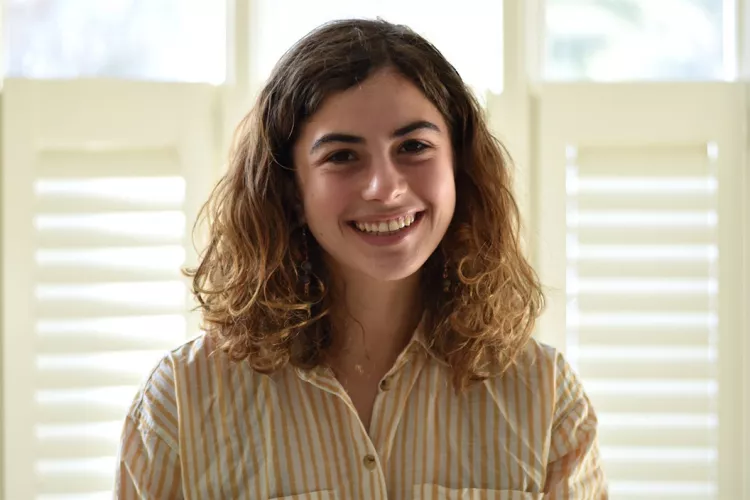Sarah Weinshel ’22 Wins Churchill Scholarship

Weinshel, who plans to complete an M.D./Ph.D after her Churchill year, is interested in exploring the broader implications of her research, particularly those related to human health.
Sarah Weinshel ’22, named a Goldwater Scholar last year, has been named a Churchill Scholar. She is the first Swarthmore student to earn the "Rhodes of STEM" in 20 years and only the sixth ever.
“I woke up to the email when I checked my phone and was in disbelief about the news until I was fully awake,” says Weinshel, an honors biology major from Minnetonka, Minn., who heard the news over winter break. “Honestly, I was just really surprised and honored.”
As a Churchill Scholar for 2022–2023, Weinshel will receive full tuition for one year of master’s study at Churchill College in the University of Cambridge, as well as a living stipend, travel costs, and the opportunity to apply for a $4,000 special research grant. With the scholarship, Weinshel will complete a master of philosophy in genetics in the lab of Professor Daniel St Johnston, researching the mechanisms of epithelial cell polarization in Drosophila fruit flies.
“It’s a major achievement for Sarah to be recognized as a Churchill Scholar,” says Fellowships and Prizes Advisor Melissa Mandos, from whom Weinshel first learned of the Churchill Scholarship program. “I’m so excited for Sarah and this opportunity to further her research interests and form lasting relationships with colleagues in the U.K.”
Weinshel, who plans to complete an M.D./Ph.D after her Churchill year, is interested in exploring the broader implications of her research, particularly those related to human health.
“Part of what drew me to this lab is the important role that epithelial cells play in human health and disease, as they form the essential barriers between all tissues and organs in animals,” she says. “For example, losing the connections between epithelial cells promotes cancer malignancy. Understanding the basic science of how those interactions are formed has a lot of important human health implications.”
Swarthmore’s newest Churchill Scholar attributes her unique problem-solving approach to her liberal arts background, which has allowed her to explore not just biology but also art and art history. As a trained biologist and art historian, she is able to approach looking at an image from a microscope with the mindset of “looking for details like a scientist and an art historian would.”
“My project at Cambridge will involve a lot of imaging of fluorescently tagged epithelial cell proteins,” Weinshel says. “I think it’s really cool to come at that from an art perspective: to see the beauty in what we’re looking at, and also have those visual skills to analyze images.”
Weinshel also credits Swarthmore’s independent research opportunities with preparing her for a Churchill year. She is now writing her senior thesis on the plant molecular genetics research she began as a freshman in Professor of Biology Nick Kaplinsky’s lab and has continued ever since.
“It has been a really amazing opportunity to learn a range of research techniques and how to think like a scientist as my project has progressed, which my biology courses have also really emphasized,” she says.
Weinshel’s professors applaud her well-earned achievement.
“Sarah is one of the most promising research students I have had the pleasure of working with at Swarthmore,” says Kaplinsky. “Her excellent work in the lab has produced an exciting new insight into how plants respond to high temperatures. I’m thrilled that she was awarded a Churchill Scholarship. She’s worked independently and never gets discouraged by the challenges of discovery.”
“Sarah truly has a spark — a love of learning, an enthusiasm, and a willingness to push herself and try new things — that makes her both incredibly productive and wonderful to work with,” adds Howard A. Schneiderman Professor of Biology Liz Vallen. “I have no doubts that Sarah will be an excellent member of the laboratory and society she will join and represent the best that the U.S. has to offer.”



